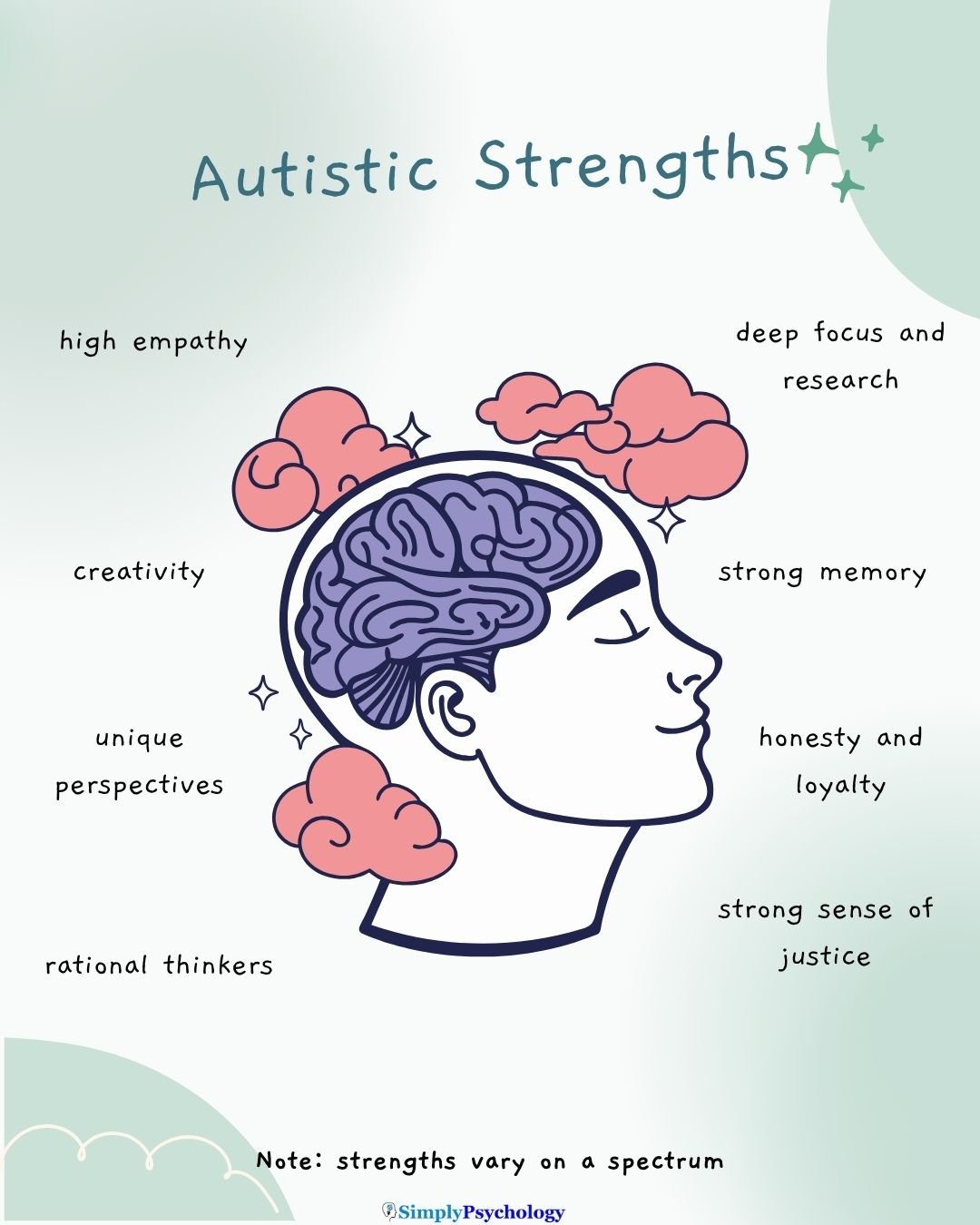Too often, discussions of autism focus on challenges and support needs. Yet many on the spectrum possess exceptional skills and positive traits – from intense focus and honesty to creativity and loyalty – that deserve recognition.
By celebrating autistic strengths, we not only foster self-esteem and wellbeing, but also promote a more inclusive understanding of autism as a spectrum of abilities.

Why Focus on Autistic Strengths?
Historically, autism has been viewed through a deficit-based lens. Medical and educational systems have often emphasized what autistic individuals struggle with. But this view leaves out an essential part of the picture.
A strengths-based approach acknowledges that autism brings not just challenges, but also unique abilities. These strengths emerge from neurological differences—not in spite of them.
It’s important to note that these strengths are not “superpowers.” While well-intentioned, this framing can feel condescending or dismissive to many autistic people, especially when it glosses over real struggles.
Recognizing strengths can help autistic individuals develop a stronger sense of self-worth, navigate the world more effectively, and feel more included.
Research supports this shift. A 2023 study published in Autism found that autistic adults who identified and used their strengths more frequently reported lower levels of depression and anxiety, and higher life satisfaction.
These findings mirror what many in the neurodiversity movement have long argued: autistic differences are not inherently negative—they’re different ways of processing, perceiving, and contributing to the world.
Common Strengths Among Autistic People
Not every autistic person has the same profile, but certain strengths show up consistently across lived experience and scientific literature.
1. Deep Focus and Hyperfocus
Autistic individuals often experience intense concentration, especially when engaged in topics or tasks they find interesting. This can lead to remarkable expertise and productivity.
“When I’m into something, I can focus for hours and block everything else out. It’s like time disappears.”
This deep focus, sometimes called “hyperfocus,” is especially beneficial in settings that require sustained attention, such as academic research, writing, coding, or art.
It’s a cognitive style that often leads to exceptional performance when properly supported.
2. Attention to Detail
Many autistic people notice small patterns, inconsistencies, or elements that others might miss. This can be a major asset in fields like editing, engineering, quality assurance, and data analysis.
“I always find the errors in things—typos, logic gaps, tiny shifts in someone’s tone. It’s like my brain is wired to scan for the unnoticed.”
This detailed perception is not just about seeing more—it’s about seeing differently.
3. Exceptional Memory
Autistic individuals often have excellent recall, particularly for facts, dates, and sequences. This can be especially strong when the material connects with a special interest.
“My memory for historical dates and events is ridiculous. I sometimes feel like a walking encyclopedia.”
This strength supports learning in school settings and mastery in work environments that require precision or factual accuracy.
4. Unique Perspectives and Problem-Solving
Autistic thinking is often more analytical or nonlinear, which means autistic individuals may solve problems in unexpected, innovative ways.
“Our team was stuck, but the autistic guy came up with an angle none of us thought of. It broke the deadlock.” – Workplace anecdote shared on social media
This type of divergent thinking is increasingly valued in industries like technology, science, and design.
5. Honesty, Integrity, and Loyalty
Direct communication and a strong moral compass are frequently cited autistic traits. Many autistic people report discomfort with lying or manipulation.
“I’m loyal to a fault. If I care about someone, I’m all in. And I don’t play games. It’s just not how I operate.” – Autistic adult quoted in research interview
These qualities can lead to trustworthy friendships and reliability in professional relationships.
6. Creativity and Artistic Talent
Despite old stereotypes suggesting autistic people lack imagination, many are deeply creative. Whether through drawing, music, writing, photography, or crafting, creative expression is often a central strength.
“Art was how I made sense of the world. I didn’t always have the words, but I had images.” – Autistic artist
This creativity is often informed by deep emotions and unique ways of perceiving the world.
7. Strong Visual and Spatial Skills
Some autistic individuals excel at visual thinking. They may find it easier to process images than words, or solve spatial problems with ease.
This strength supports success in fields like architecture, graphic design, photography, and mechanics.
8. Reliability and Preference for Routine
Predictability and structure are often comforting to autistic individuals, and many prefer clear rules and routines. This can translate into punctuality, consistency, and high reliability at school or work.
“I like routines because I know what to expect. It helps me stay calm and do my best.” – Autistic student
Employers often find that autistic team members bring steadiness and dependability to their roles.
9. Strong Sense of Justice and Empathy
Contrary to the stereotype that autistic people lack empathy, many have a powerful moral compass and deep empathy for others’ suffering.
They may be highly principled, championing fairness and honesty.
“I have a strong sense of justice and will fight for what I think is right.”
Research also suggests autistic individuals are often less influenced by social biases or herd mentality, allowing them to question norms and treat people more equitably.
Seeing the world “differently” can mean spotting injustices that others ignore and speaking up – a tremendous strength for social progress.
Strengths in Education
In educational settings, autistic students may excel in subjects that align with their interests and thinking styles.
Strengths like attention to detail, focus, and long-term memory can support success in subjects such as math, history, science, and art.
One review of academic research found that common strengths of autistic learners include “strong memory, focus, precision, dedication, analytic skills, remarkable powers of observation, sincerity, impartiality, and willingness to listen to others.”
However, these strengths often go unrecognized when teaching methods or classroom environments aren’t flexible.
Providing clear expectations, sensory-friendly spaces, and opportunities to explore personal interests can make a significant difference. Autistic students tend to thrive when schools build on their strengths.
Of course, some autistic students do face significant challenges in typical school environments (social difficulties, sensory distractions, etc.), and not all will have academic strengths in the same areas.
The key is a supportive, understanding approach that accommodates needs while also highlighting each student’s abilities.
Strengths in the workplace
In the workplace, autistic adults can be valuable employees, especially in roles that require precision, creativity, or independent thinking.
Many autistic professionals report excelling in fields like software testing, data analytics, research, engineering, and the arts.
Autistic individuals often report that their special interests became academic or career pathways.
If a student is fascinated by a topic (be it astronomy, trains, coding, or art), they might spend countless hours learning everything about it – going far deeper than the average peer. This can also make them very strong PhD candidates.
“I’m not great at small talk, but give me a project and I’ll finish it better and faster than most people.” – Autistic software engineer
They are also less prone to workplace drama or gossip, tending to be straightforward and task-focused in their communication. This means they might offer unfiltered, honest insights or catch issues that others miss, simply because they’re evaluating situations more rationally and less through a social lens.
Workplaces that understand and support neurodiversity—by offering flexible communication styles or quiet spaces, for example—are better positioned to unlock these strengths.
Not Everyone Has the Same Strengths
While many autistic people share similar strengths, it’s essential to remember that autism is a spectrum. One person may have exceptional memory but struggle with organization. Another may be highly creative but dislike routines.
Avoiding stereotypes is just as important as avoiding deficit-focused views. A strengths-based approach means asking, “What does this person do well, and how can we support it?”
Why Strengths Deserve More Attention
Focusing on challenges alone contributes to stigma and limits opportunity. When strengths are recognized, autistic individuals are more likely to:
- Build confidence
- Develop self-advocacy skills
- Thrive in school and work
- Form supportive, authentic relationships
Experts agree that recognizing strengths leads to better outcomes. According to developmental psychologist Dr. Devon MacEachron, “When we build on strengths rather than trying to fix weaknesses, we give people a real chance to flourish.”
Final Thoughts
Autistic strengths are real, meaningful, and varied. From creative problem-solving to deep empathy and attention to detail, these traits have value not just for autistic individuals, but for the communities they live and work in.
By understanding and celebrating these strengths, we move toward a more inclusive world—one that recognizes that different ways of thinking enrich us all.
Rather than asking how autistic people can change to fit the world, perhaps we should ask how the world can change to recognize their strengths.
References
Rozenkrantz, L., D’Mello, A. M., & Gabrieli, J. D. (2021). Enhanced rationality in autism spectrum disorder. Trends in cognitive sciences, 25(8), 685-696.
Taylor, E. C., Livingston, L. A., Clutterbuck, R. A., Callan, M. J., & Shah, P. (2023). Psychological strengths and well-being: Strengths use predicts quality of life, well-being and mental health in autism. Autism, 27(6), 1826-1839. https://doi.org/10.1177/13623613221146440
Van Hees, V., Moyson, T. & Roeyers, H. Higher Education Experiences of Students with Autism Spectrum Disorder: Challenges, Benefits and Support Needs. J Autism Dev Disord 45, 1673–1688 (2015). https://doi.org/10.1007/s10803-014-2324-2

